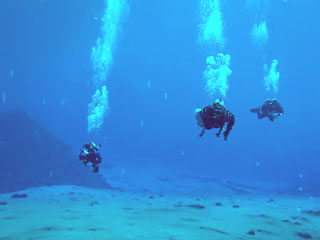#scuba #scubadiving #nitrox #eannitrox #partialpressure #daltonslaw #jcaelitescuba #whiteboardlesson
Whiteboard Lesson: "Partial Pressures"
Understanding partial pressures are important to the scuba diver...
Dalton's Law states that, "the total pressure exerted is equal to the sum of the partial pressures of the individual gases."
Two considerations of an increase of partial pressures when breathing compressed gas at depth underwater is oxygen toxicity and nitrogen narcosis.
As the partial pressure of oxygen increases and we approach the maximum recreational limit of 1.4 atmospheres, we risk the possibility of seizures occuring underwater. Luckily, most divers won't be diving close to 200ft anytime soon so that risk is very minimal.
However, nitrogen narcosis, a feeling of intoxication, which can lead to poor decision making among other things, can occur at a partial pressure of as little as 4 atmospheres when breathing air. Since nitrogen composes about 78% of the air we breath, narcosis management is a necessary factor to consider.
One way to manage narcosis is to learn to dive on and use "Nitrox."
Using nitrox has other benefits that can help a diver dive deeper, have longer bottom times, and even manage nitrogen absorption.
Learn more about all of these things when you take your nitrox course with JCA Elite Scuba. Give me a call so we can start your class today...




















